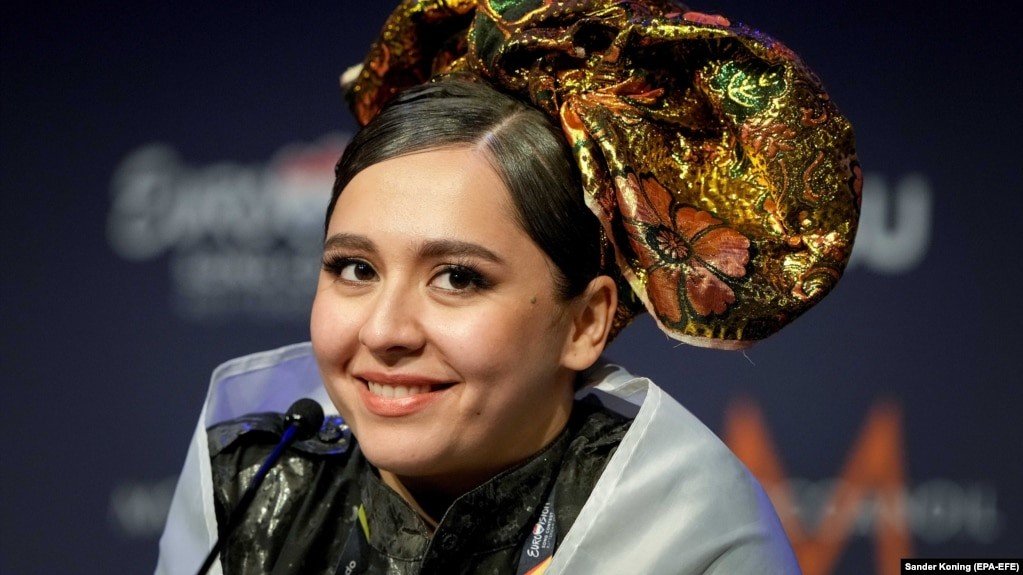The Tajik-born singer representing Russia in this year’s Eurovision Song Contest says her berth in the finals this weekend is “like a dream.” But she says the problems she and other immigrants face in Russia won’t ever be far from her mind.
Manizha vowed to maintain the internal bearings that have led the “contradictory” 29-year-old performer and United Nations goodwill ambassador to the brink of international pop fame.
“No position on the top charts, no position in the Eurovision rankings, no prizewinning nor non-prizewinning position can affect my internal position,” she told RFE/RL’s Tajik Service on May 18 after she advanced from the semifinals along with acts from nine other countries.
“My priority from before Eurovision will remain after it — to tell the truth, to be honest with the audience, [and] to invite the creativity that can inspire people to change and happiness,” she says.
Manizha is a first-generation Tajik immigrant whose selection to represent Russia provoked controversy among critics who suggested the job should be left to ethnic Russians.
She is also a reminder of the painful vestiges of Soviet policies in Central Asia, including the civil war in the early years of post-Soviet independence that drove her family from their native Tajikistan in the mid-1990s.
The peppy, playful performance at Eurovision of her song Russian Woman begins with the singer stiffly encased in a huge, cage-like dress before she emerges in a red jumpsuit and a hip-hop cadence.
Manizha is herself a torrent of creativity, billed not only as the songwriter but also as director and cinematographer of her own music videos.
She began performing as a child, and spent time with a handful of bands before going solo and making her music in London and New York.
It has been a long road for the singer and songwriter, whose family reportedly escaped Tajikistan after artillery fire struck their home.
“I still don’t feel like this is really happening. Everything, like in a dream, is true,” Manizha told RFE/RL. “The most important thing is that we managed to overcome all the fears, all the anxiety, all the tension — this pressure that had been going on for several months — and went on stage and really enjoyed the performance.”
Manizha’s publicity material describes her on the Russian-language competitor to Facebook, VKontakte, as “a DIY artist and bright Instagram star.”
She has more than half a million followers on Instagram but a more modest 87,000 followers on the mostly Russian VKontakte.
After her selection, challenges emerged from politicians and social-media users questioning her “Russianness” or suggesting that she was an inappropriate choice.
Some Russian and outside analysts have contrasted her inclusive messages with President Vladimir Putin’s two decades in power.
Under Putin, Moscow has shored up the Russian language’s preeminence in education around the country, even at the expense of minorities, and promoted social and cultural conservatism as well as “traditional Russian” values.
Nearly 200 national or ethnic groups were represented in Russia’s last census, in 2010.
Various estimates put the number of migrant workers in Russia from Manizha’s native Tajikistan and the rest of Central Asia — Kazakhstan, Kyrgyzstan, Turkmenistan, and Uzbekistan — at around 10 million to 12 million.
Though they shared Soviet citizenship with Russians during the Soviet era, nationals from those republics are now frequent targets of discrimination, including physical attacks and alleged abuse at the hands of police in today’s Russia.
Even as she belts out her song to an expected 180 million or so viewers of this weekend’s finals, Manizha told RFE/RL she is less likely to be worrying about herself than the obstacles she and other immigrants face.
“I’ll probably only be worrying about the fact that, somehow, our rights are violated, worrying about the fact that someone right now has no opportunity to obtain documents [or] citizenship, or a situation that interferes with living a full life — this is access to education,” Manizha said. “I’m more worried about these things.”
Russia began competing independently in the Eurovision Song Contest in 1994, and has been a frequent finalist since the 2000s — including a 2008 victory by Dima Bilan with the song Believe.
Whatever the Russian public thought of Manizha or the controversy around her selection, it’s clear that Russia’s organizers have sought to project breadth, tolerance, and diversity in this year’s competition.
Manizha’s mother, Najiba Usmanova, reportedly sketched the designs for the kaleidoscopic dress her daughter wears — and sheds — onstage.
It was made from swatches of fabric donated from all over the country, including traditional patterns from Yakutsk and Khanty-Mansi.
Manizha is a goodwill ambassador for the UN’s refugee agency, the UNHCR.
She’s also a vocal feminist and supporter of LGBT rights, a community that has been officially and unofficially persecuted in Russia.
Some of Manizha’s best-known songs before Eurovision came from her 2019 album Womanizha, and deal with issues of identity.
“I’m not quite a Slav, not quite a Tajik,” she sings in one.
Speaking to RFE/RL, she talked about feeling like an “other” when visiting Tajikistan.
https://www.rferl.org/embed/player/0/31144071.html?type=video
“It’s cool to be born in Tajikistan and leave, preserve your inner Eastern traditions [and], at the same time, become a European resident,” she said. “I’m very pleased by support [from Tajiks] because my message is quite contradictory and I, of course, worried about the reaction. But I haven’t received a single negative reaction from Tajikistan.”
But she also has said she’s happy that she’s able to write — and find an audience — in Russian. –RFE/RL
Written by Andy Heil based on an interview by RFE/RL Tajik Service correspondent Khiromon Baqozoda

The High Asia Herald is a member of High Asia Media Group — a window to High Asia and Central Asia

